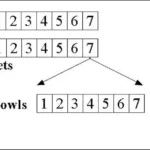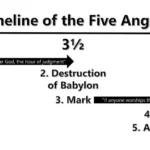Definition of parousia
The Greek word “parousia” (pronounced par-oo-see-ah) is a term that simply means “a coming” or “a presence.” In the New Testament it is most commonly used in reference to the coming of the Lord Jesus. The confusion comes when pre-tribbers claim exclusivity for the term taking it to only mean the coming of the Lord for His church at a pre-tribulational rapture prior to the seven year tribulation period whereas they say that the Greek term “apokalupto” where we get the English transliterated word apocalypse, is exclusively used for the second coming at the end of the seven year tribulation. Apokalupto is often translated as “revealing” in English Bibles and is even the actual title of the book of Revelation. But parousia can mean the coming of any person in any context not just to a special coming of the Lord Jesus. For example, Paul writes of “the coming of Stephanas and Fortunatus and Achaicus.”1 Paul also writes of “the coming of Titus.” The term is also used to refer to Paul’s presence.2 There is nothing special about the word and so I think it is disingenuous to take it only in an eschatological sense.
Parousia=apokalupto
In fact I believe that it can be used interchangeably when Jesus comes for His church at the rapture and when He comes at the very end, on the Day of Atonement. The two comings are only separated by ten days and I believe that I can prove to you from Scripture that His coming and His revealing are really just referring to the same general event. Jesus says how the coming (parousia) of the Son of Man will be like the days of Noah–unexpected in a sense.3 He says that two men will be in the field; one will be taken and the other left. Two women will be grinding with a hand mill; one will be taken and the other left. The corresponding passage in Luke has the exact same context about Noah and how one will be taken and one left.4 But Luke also adds some extra detail about Lot in the next couple of verses. The important point though is that in Luke, Jesus says that this is the day that the Son of Man is revealed (apokalupto).5 So in essence even though the two accounts in Matthew and Luke are referring to the same event, parousia and apokalupto are used interchangeably. In other words parousia = apokalupto. One (Matthew passage) says at the coming of the Son of Man and the other (Luke passage) says on the day that the Son of Man is revealed. They are one and the same event. This destroys the pre-trib assumption that the two words are used for two different events separated by seven years. The revealing of the Son of Man occurs ten days before He defeats the Antichrist at Jerusalem in the Battle of Armageddon because the sign of the Son of Man appears in the sky immediately after the tribulation (Matt. 24:30). The coming (parousia) of the Son of Man will be visible everywhere like lightning that goes from the east to the west.6
Parousia does not exclusively refer to the rapture of the church or the second coming at the very end but it refers generally to the same event. Both parousia and apokalupto are talking about the same event with slightly different angles or emphases. Sometimes parousia is used and sometimes apokalupto depending on the context and the passage.
Believers are urged to flee
This is important and has big implications because pre-tribbers claim that Matt. 24:31 does not refer to the rapture of the church even though it has all the common elements of the Son of Man coming (parousia again) on the clouds of the sky, a loud trumpet call, angels and a gathering from the four corners of the earth of the elect. Upon careful examination of the 1 Thessalonians passage (accepted rapture passage) it has all the same elements as the Matthew passage.7 As the proverbial saying goes, if it walks like a duck and quacks like a duck then it is most likely a duck. Furthermore pre-tribbers claim that the passages in Matthew8 and in Luke9 do not refer to the rapture and a gathering of the saints by angels into the air but a taking away of the wicked to judgment. In their thinking the ones left behind are the good ones–the so-called tribulation saints that go into the millennial kingdom. This does not make sense at all. When Lot, his wife and two daughters were taken away by the two angels they had a choice to go and they were taken, led away by hand to protection and salvation and they escaped the fire and brimstone of judgment. The passages in Matthew and Luke seem to also indicate that one has a brief moment to make a choice whether to go or not with the angels assigned to the task of gathering the elect. Believers are urged to go and not tarry and go back and get ones coat etc.
The easier choice is to escape when we can
So do you see what they are doing? In one instance they are saying that the raptured who are “taken” in John10 are the good ones but in Matthew,11 the ones who are taken are the bad ones, taken away into judgment. When examining the word for “taken” both in John and Matthew it is the same Greek word “paralambano” which means to be led away to a particular point. That ties in perfectly when you think that Lot and his two daughters were led away from disaster by the two angels. My understanding is that the “taken” are always the ones taken into salvation because it is talking about the same event not different events. The Matthew passage does exactly refer to the rapture of the saints remaining on the earth at that time after the tribulation. The instructions in Matthew to the “elect” Christians remaining on the earth who didn’t escape in time to Jordan at the half-way point and didn’t take the mark of the beast and were not martyred, is to keep watch and be ready to go with the angels at the appropriate time.12 It appears again and again that God gives His people so many opportunities to choose Him, it’s just that those choices are much easier if we decide to heed the call to escape when we can and be a part of the woman of Revelation 12 some 3 ½ years earlier.
Conclusion
In conclusion, there is a confusion between the two terms “parousia” and “apokalupto” but one shouldn’t make a distinction saying that one is used for the rapture and one for the second coming right at the end. It is my belief that Christ both comes and is revealed at the same time although the gathering of the saints and the final consummation of events is separated by ten days which is the intervening period between the Feast of Trumpets and Day of Atonement (1 Tishrei – 10 Tishrei). Therefore what I am saying is that the two words are used interchangeably for the one and same event because the coming and appearing of the Son of Man, the rapture and gathering of the saints all happens around the same time within a ten day period after the tribulation.

















One Response
Thank you again Steve for the exposition of scripture. I listen to Mandy Worby on Vision Christian radio, she also uses translation of the original text to explain historical and current events. We are blessed to have biblical scholars in our midst to illuminate the truth.